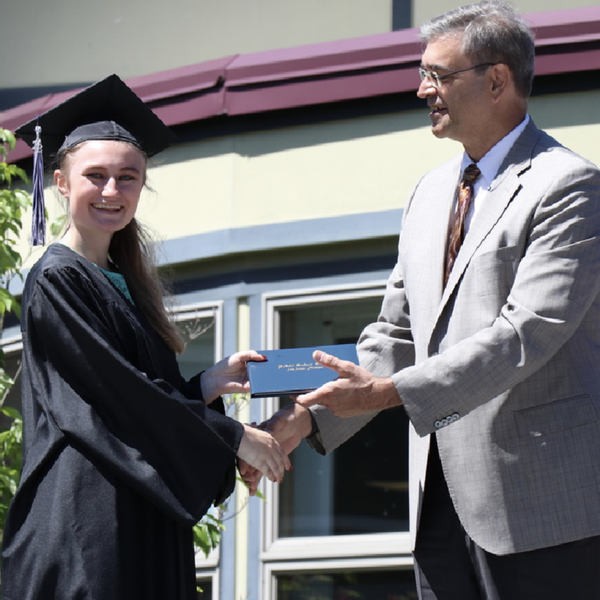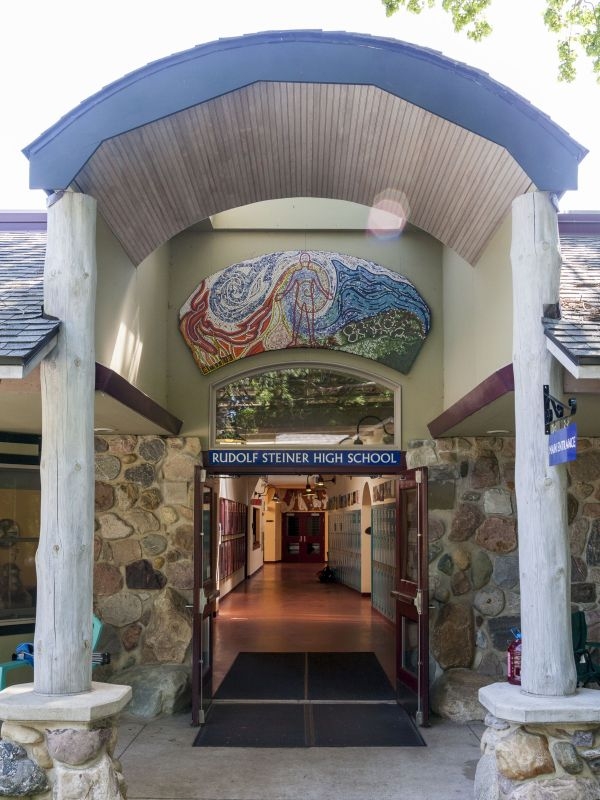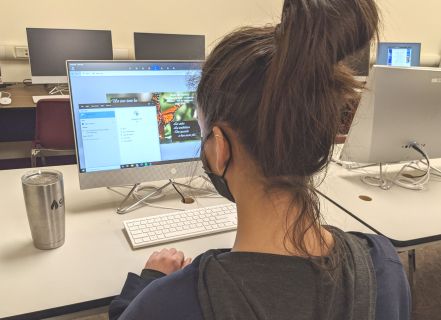

Waldorf Graduates Pursue Meaningful Careers

Will My Child Succeed After Waldorf High School? The Research Says Yes
Choosing a high school is a critical decision, and parents often wonder: Will this education prepare my child for college, career, and life?
For families considering Waldorf high schools, this question is especially relevant. With experiential learning, seminar-style discussions, and an interdisciplinary curriculum, can Waldorf truly equip students for fields like medicine, law, technology, and business?
Decades of research say yes.
Waldorf Graduates Excel in Higher Education and Careers
A 60-year study (Survey of Waldorf Graduates, Phase II, Mitchell & Gerwin, 2007) found that:
- 94% of Waldorf graduates attend college.
- 42% major in science-related fields—more than double the national average.
- Many earn advanced degrees in medicine, law, engineering, business, and the arts.
- Alumni thrive in fields ranging from finance and research to entrepreneurship and sustainability.
Waldorf Alumni Spotlight: Science in Action
After earning a degree in Earth Systems Engineering from the University of Michigan, Gavin Chensue ('06) joined the NOAA Commissioned Officer Corps, leading critical climate studies worldwide.
"Steiner education gave me a taste of everything. When I needed direction in college, I remembered how much I loved studying weather and geology—and that led me to where I am today." - Gavin Chensue (RSSAA '06), Research Engineer at SRI International, Former NOAA Corps Officer
His story highlights how Waldorf graduates succeed in STEM, combining curiosity and real-world problem-solving to make a global impact.
Read the full studies:
- Survey of Waldorf Graduates, Phase II: https://www.waldorfeducation.org/research
- Into the World Study: https://www.waldorfeducation.org/graduate-outcomes
What Makes a Waldorf Education So Effective?
Contrary to the belief that test-driven education leads to success, research shows that employers and universities highly value graduates who:
✔ Think critically and independently
✔ Communicate clearly and persuasively
✔ Collaborate effectively
✔ Solve complex problems
✔ Adapt to a changing world
These are precisely the skills Waldorf high schools cultivate.
1. Depth Over Memorization: Lifelong Knowledge Retention
Rather than rote memorization, Waldorf fosters deep understanding:
- History is explored through primary sources and narratives.
- Science emphasizes hands-on experiments and independent research.
- Mathematics focuses on real-world application.
- Literature and philosophy encourage analytical discussions.
One employer noted:
“Waldorf students don’t just look for the right answer—they explore the why and how behind complex issues.”
2. Seminar-Style Learning Develops Exceptional Communicators
Waldorf emphasizes oral presentations, debates, and collaborative discussions, preparing graduates for leadership roles in law, finance, business, and medicine.
Dr. Ilan Safit, co-author of *Into the World*, states:
“We consistently hear that Waldorf graduates excel at teamwork and leadership. Their ability to articulate complex ideas is a major asset.”
A study from Da Vinci Waldorf School found that Waldorf students select careers based on values and passion rather than prestige or income.
Final Thoughts: The Research Speaks for Itself
Professors and employers highlight Waldorf graduates’ intellectual curiosity and ability to think independently.
With strong college attendance rates, success across multiple professions, and the skills needed to navigate a complex world, one thing is clear:
Waldorf graduates don’t just succeed—they thrive.
Professors and employers highlight Waldorf graduates’ intellectual curiosity and ability to think independently.
With strong college attendance rates, success across multiple professions, and the skills needed to navigate a complex world, one thing is clear:
Waldorf graduates don’t just succeed—they thrive.
Read more on Waldorf Graduates
Selecting a High School

Selecting a High School
Advice from Veteran Waldorf Educators
Choosing the right high school can feel like one of the most significant decisions a family will make in their child’s educational journey.
To bring clarity to this decision, we turned to two of our most experienced educators at the Rudolf Steiner School of Ann Arbor: Margot Amrine, a longtime Waldorf teacher with over four decades of experience, and Dr. Siân Owen-Cruise, our former School Administrator, who has guided countless families through the high school selection process.
Today’s parents listen to and respect their children’s perspectives more than ever before- a positive shift in family dynamics. But as Margot reminds us, that doesn’t mean parents should surrender their leadership on big decisions.
“In our family we said that Waldorf Education for 9th and 10th grade was essential. At 11th grade, a different kind of maturity sets in; if our children had made compelling reasons to leave then, we would have considered. We never had these discussions!”
Dr. Owen-Cruise expands on this, acknowledging that social pressures play an outside role in an 8th Grader's thinking:
“It's natural for teenagers to focus on their peers and social dynamics when thinking about high school. As parents, we listen, we understand, and we take their feelings seriously- but ultimately, we need to lead this decision with wisdom and foresight.”
Dr. Owen-Cruise often frames the conversation with the rising student in the following way:
“Your parents will choose where you receive your high school education, with your input. YOU will choose where you go to college, with our parental input.”
Many families who have walked this path find that their children- whether they started in Waldorf Education or joined from another school-ultimately express gratitude that their parents guided this decision with their long-term development in mind.
Here are some other helpful tips and information when thinking about our own High School:
Waldorf Graduates Pursue Meaningful Careers
“Will My Child Succeed After Waldorf High School? The Research Says Yes” - Blog Article
Parents often ask: Does a Waldorf education prepare students for college, careers, and beyond? The answer is a resounding yes. Studies show that Waldorf graduates not only attend college at high rates but also excel in fields like science, medicine, law, and technology. Employers and universities consistently praise their ability to think critically, communicate effectively, and adapt to a changing world. Want to know why? This article dives into the research and real-world successes of our alumni.
The Joy of a Phone-Free School: How Our Students Thrive Without Screens
"The Joy of a Phone-Free School: How Our Students Thrive Without Screens" - Blog Article
In an age where screens dominate every aspect of life, imagine a school where students engage in real conversations, dive into hands-on projects, and focus fully in class—without the pull of notifications. Our phone-free policy isn’t just a rule; it’s a game-changer. See how it shapes our students’ social and academic lives!
The Joy of a Phone-Free School: How Our Students Thrive Without Screens

The Joy of a Phone-Free School: How Our Students Thrive Without Screens
Imagine a typical school day where students, between classes and during breaks, are glued to their smartphones—scrolling through social media, playing games, or texting. Conversations are sparse, eye contact is minimal, and the vibrant energy of youthful interaction seems subdued. Now, contrast this with a school environment where smartphones are set aside: students engage in lively face-to-face discussions, participate in spontaneous games, and immerse themselves fully in classroom activities without the constant pull of notifications. This is the reality we’ve cultivated at Rudolf Steiner School of Ann Arbor, embracing a phone-free policy that fosters genuine connections and holistic development.
The Deeper Engagement of Phone-Free Education
At our school, we’ve observed that removing smartphones from the school day does more than just eliminate distractions—it rekindles a deeper, more meaningful engagement among students. Freed from screens, students rediscover the joy of direct communication, collaborative problem-solving, and hands-on learning. This environment aligns seamlessly with the principles of Waldorf education, emphasizing experiential learning and nurturing the whole child.
We Are Phone-Free, Not Tech-Free
While our school maintains a phone-free environment during school hours, we are not devoid of technology. In fact, our curriculum incorporates technology in age-appropriate ways to ensure students are prepared for the digital world:
• Middle School: Students are introduced to computers and the internet in an intentional way that supports learning. Additionally, our middle school robotics club fosters interest in technology and engineering through hands-on projects. https://www.steinerschool.org/programs/extracurricular-activities.cfm
• High School: Our state-of-the-art computer lab facilitates courses in coding, digital literacy, and other computer science subjects. We also have an active high school robotics club where students collaborate on competitive projects that develop real-world problem-solving skills. https://www.steinerschool.org/about-us/waldorf-education.cfm
Many of our graduates go on to thrive in technology fields, excelling in computer science, engineering, and data analysis. Research shows that Waldorf graduates develop strong interdisciplinary thinking skills that prepare them for success in fields that require both creativity and technical expertise.
Leading the Way in Ann Arbor
Our commitment to a phone-free school day positions us as pioneers in the Ann Arbor educational community. While some other local schools have implemented partial restrictions, our comprehensive approach ensures that students remain unplugged throughout the day—including breaks and transitions between classes.
Several Ann Arbor schools are recognizing the value of limiting phone use:
• Forsythe Middle School and Tappan Middle School both require students to keep phones in lockers during school hours. https://forsythe.a2schools.org/our-school/cell-phone-policy, https://tappan.a2schools.org/our-school/cell-phone-policy
• Huron High School has introduced classroom phone storage policies in its Mathematics and English departments to help students stay focused. https://thehuronemery.com/9731/news/cell-phone-use-teacher-led-procedures-to-enrich-student-experience/
The Transformative Power of Disconnecting
The shift to a phone-free environment has yielded profound benefits:
• Enhanced Academic Focus: Without the allure of smartphones, students engage more deeply in lessons, leading to improved comprehension and retention.
• Strengthened Social Bonds: Face-to-face interactions during breaks and collaborative projects foster authentic relationships and empathy among students.
• Improved Mental Well-being: Reducing screen time has been linked to decreased anxiety and stress, allowing students to be more present and mindful.
Embracing a Connected Future Without Phones
As more schools recognize the value of limiting smartphone use, it’s evident that this movement is not about restricting technology but about reclaiming the essence of human connection and focused learning. By leading the way in this initiative, Rudolf Steiner School of Ann Arbor not only adheres to the foundational principles of Waldorf education but also prepares students for careers in STEM, the arts, and beyond.
We invite families seeking a nurturing, distraction-free educational environment to join us in this journey, where students can truly engage with the world around them and develop into well-rounded individuals.
Explore the experiences of other schools with phone-free policies:
• “New data reveals shocking trend since school mobile phone ban”
- “The big smartphone school experiment”
https://www.thetimes.co.uk/article/inside-schools-ban-smartphones-6knb8qtfc
- “Cell phones hinder classroom learning. Texas should tell school districts to lock them up”
- "Waldorf Schools are Media Literacy Role Models"
https://www.steinerschool.org/about-us/waldorf-schools-are-media-literacy-role-models/
How Waldorf Students Stand Out
With an increasingly competitive college admissions process, grades and test scores are no longer the final deciding factors for students to be accepted into the colleges of their choice. Applicants need to find ways to distinguish themselves from the crowd. Waldorf school graduates bring a unique perspective, set of experiences, and skill set. The Waldorf approach, which incorporates the arts, outdoor education and hands-on learning into academics, helps our graduates stand out as individuals. They are curious, creative, and confident, experienced in working with their peers, their hands and their minds. Their ability to listen, articulate their ideas, advocate for themselves and others, and work both independently and collaboratively helps them thrive in college and beyond. That is why colleges and universities across the country have recognized the degree to which Waldorf graduates enhance their student bodies.
Originally published by Ilan Safit – Humanities Teacher at Rudolf Steiner School New York City, Co-author of Into the World: How Waldorf Graduates Fare After High School, and Editor of the Research Bulletin for Waldorf Education
How do Waldorf students fare after graduation? How many of them go to college? What subjects do they choose to major in at college? Do they feel that their Waldorf education prepared them well for post-secondary studies? Did we, in fact, prepare them well for college? And then what? What do they do next? What professions do they choose for themselves? What kind of lives do they tend to live? How are they doing financially? How is there health? And are they—if we may dare ask—, at the end of the day, happy?
 These are some of the questions that the Research Institute for Waldorf Education was set out to answer with its recent survey of Waldorf graduates in the book entitled Into the World: How Waldorf Graduates Fare After High School. Information was gathered through two extensive online surveys – one aimed to capture the experiences of those who graduated from a Waldorf high school in the past 10 years (and are therefore expected to be “college age”), another directed at those who are farther along on their life journey, as they had graduated high school in the period between 1990 and 2010.
These are some of the questions that the Research Institute for Waldorf Education was set out to answer with its recent survey of Waldorf graduates in the book entitled Into the World: How Waldorf Graduates Fare After High School. Information was gathered through two extensive online surveys – one aimed to capture the experiences of those who graduated from a Waldorf high school in the past 10 years (and are therefore expected to be “college age”), another directed at those who are farther along on their life journey, as they had graduated high school in the period between 1990 and 2010.
In addition, a small team of researchers working on this project conducted a set of interviews with recent and not so recent Waldorf graduates, both in a one-on-one setting and in groups. And we benefitted greatly from the online survey respondents who chose to elaborate further, and at times in great detail, about the aspects of their lives and their perception of the role that Waldorf education played in shaping them.
This offered us a narrative treasure-trove of personal impressions, perceptions, and reflections. From this qualitative data we’ve learned that Waldorf graduates cherish their schooling greatly and are aware of how it instilled in them healthy habits of learning, working, and living. They often feel that it has prepared them well for college by showing them how to learn and study, thereby enabling them to take on subjects and fields that they might not have explored in their secondary education.
Quantitative data collected through the online surveys show us a decisive portion of graduated (close to 46%), major in either the Social & Behavioral Sciences, Exact Sciences, or other STEM subjects, while 28% major in the Arts & Humanities. In terms of professions, we found the largest discernible group of alumni (15.5%) working in Education (across the full spectrum from early childhood to academia), followed by Medical and Health-related professions (12.3%), followed by those working in creative fields of Arts, Entertainment, and Media (12%).
A composite profile of the recent Waldorf graduate tells us that they (practically all) attend college, for which they feel strongly prepared (95%), are accepted to the top three colleges or universities of their choice (90%), complete their initial degree (92%), and often choose thereafter to continue to graduate or professional training schools. They also feel that their Waldorf education prepared them to be creative and innovative, open minded, empathic, and to take on leadership roles.
This, of course, is just a taste of the findings collected in the book resulting from this study, which contains also detailed comparisons with similar, nation-wide surveys conducted by the National Associations of Independent Schools, as well as in-depth analyses, interviews, and testimonials.
Education for an Unpredictable Future
Teens Feel Ready for College, But Not So Much for Work
A new poll found that 74 percent of high school students think they’ll have a job in 20 years that hasn’t been invented yet. How do schools prepare students for that future? In Waldorf education we focus on helping students develop creativity and problem solving skills, communication, teamwork, and empathy, as well as the ability to take their ideas and put them into practice in the real world. These skills are foundational, and prepare students to successfully navigate the unpredictable and rapidly changing world of work and the diverse paths to higher education.
This piece was originally published by Alyson Klein in Education Week
High schoolers believe that their educational experience is getting them ready for college. But they’re less certain that their coursework is preparing them for the world of work.

That’s one of the big takeaways from surveys published recently by the Ewing Marion Kauffman Foundation, a nonprofit philanthropy based in Kansas City, Mo. The survey found that 81 percent of students felt that high school got them “very” or “somewhat” ready for college, compared with just 52 percent who felt it prepared them for the workforce.
“People are coming out of this sort of either-or,” said Aaron North, the vice president of education at the Kauffman Foundation. “You’re going to college, or you’re not. You’re getting a job after high school or you’re not. I think that’s not reflective of the reality of what’s on the other side of that graduation stage for them.”
He expects that, in the future, many students will transfer in and out of the workforce, gaining both educational credentials and on-the-job experience.
The survey also found that students and adults in general expect that technology and computer science jobs will be a major growth industry, with 85 percent of adults and 88 percent of students saying they expect those gigs to be in “much” or at least “somewhat more” in demand in the next decade.
And 74 percent of students think they’ll have a job in 20 years that hasn’t been invented yet.
Students “have only grown up in an age of really accelerated tech evolution,” North said. “I think that’s just the world that they are in. It is a world of creation. It is a world of change.”
‘Practical Connection’ Needed
Overwhelmingly, students, parents, and employers surveyed thought high schoolers would be better off learning how to file their taxes than learning about the Pythagorean theorem. At least 82 percent of parents, students, and employers thought schools should focus more on the 1040-EZ form than on that fundamental concept in geometry.
And 81 percent of students said they thought high school should focus most closely on helping students develop real-world skills such as problem-solving and collaboration rather than focusing so much on specific academic-subject-matter expertise.
“I think what that highlights is this idea that there needs to be this practical connection between what and how you are learning when you’re in school and what happens when you’re not in school,” North said. “So that doesn’t mean it has to be directly related to your everyday life, but it does mean that there could be a balance between things that may be applicable to a very narrow number of fields and things that are highly applicable to your life no matter what field you go into or what path you choose.”
Employers are also more likely to rate employees highly if they have completed an internship in their industry and have technical certifications than if they only have a college degree, the survey found.
But at the same time, 56 percent of employers surveyed felt that someone with only a high school degree would be held back from success in life because of their education. Students were even more convinced of the benefits of college, with 63 percent saying that having only a high school education would be a roadblock to success.
Still, most adults—59 percent of those surveyed—said they can’t connect what they learned in high school to their current jobs. That’s especially true of workers in blue-collar jobs, 61 percent of whom say that their jobs weren’t relevant to their high school educations, compared with 52 percent of white-collar employees.
“Parents who have experienced a noncollege pathway understand that those pathways are viable and they can lead to really good options,” North said. “A huge percentage of our population ends up not getting a college degree. And so there are millions and millions of people out there navigating the nondegree world, without much of a road map, the kind of road map we’ve provided around college. So I think that’s reflective of people who have found that and are understanding that, whether it’s for themselves or for their own kids.”
Old Strategies, New Jobs
Similarly, a separate report released last week by the RAND Corp., found that the needs of the workforce have transformed dramatically thanks to technological changes, globalization, and demographic shifts. But K-12 schools, postsecondary institutions, and job-training organizations are preparing students for jobs using essentially the same set of strategies they’ve been relying on for decades.

At the same time, employers are struggling to find workers with so-called “21st-century skills” such as information synthesis, creativity, problem-solving, communication, and teamwork. Yet the path forward is not easy for workers looking to upgrade their skills because of automation or shifting consumer demands.
“Employers are saying they can’t find employees with the skills they need, and on the other end, you have workers whose jobs have been made less relevant,” said Melanie Zaber, an associate economist at RAND, a nonprofit research organization.
The blame shouldn’t be all on schools, the RAND report emphasizes. Employers and education and job-training institutions don’t do a great job of systematically sharing information with schools that would allow them to better prepare students for the changing needs of the workforce. Plus, funding for K-12 education isn’t equally distributed and often neglects the areas that need strong pre-career training the most.
What also makes progress difficult is that high school principals rarely get to see how their students are doing years after they leave the classroom, Zaber said. “Letting high school principals see what happens when students leave their doors can help inform policy for where the gaps are, where the barriers are, where students are being let down,” she said.
